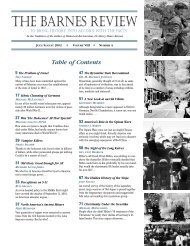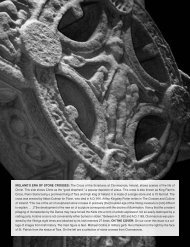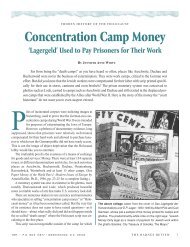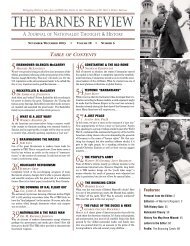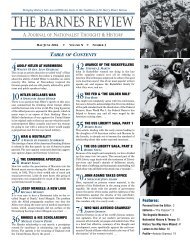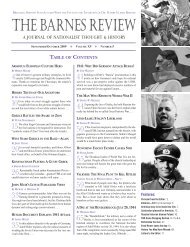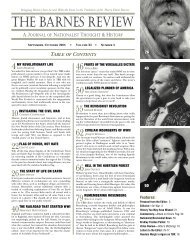Create successful ePaper yourself
Turn your PDF publications into a flip-book with our unique Google optimized e-Paper software.
PAGE 48 the barnes review MAY/JUNE<br />
greatest villainies ever perpetrated on the<br />
American people and FDR was its chief<br />
architect, engineer and provocateur.<br />
Because Japan regarded Russia as a<br />
mortal and historic enemy, she considered<br />
the 1905 Portsmouth Treaty—brokered by<br />
Teddy Roosevelt to end the Russo-Japan -<br />
ese war—as having prevented her from<br />
achieving a complete victory over Russia. 23<br />
Further, ever since Japan had been forced<br />
to end her isolation, literally with a gun to<br />
her head, Russia, and later the Soviet Un -<br />
ion remained the greatest threat to her<br />
security. 24 In fact, “fear of Russian expansion<br />
into Manchuria and Korea still haunted<br />
Japan’s leaders” late into the 1930s. 25<br />
Roosevelt, without question, had to know<br />
the menace with which Nippon regarded<br />
Stalin’s communist dictatorship. Our Am -<br />
bassador to Japan, Joseph Grew, who was a<br />
school chum of FDR’s from Groton and<br />
Harvard would have kept his president<br />
fully informed on such matters. 26 And yet,<br />
Roosevelt thumbed his nose at this potential<br />
threat to Japanese security, and the<br />
certain reaction it would generate, by formally<br />
recognizing the Soviets on November<br />
16, 1933. 27 In so doing he made it abundantly<br />
clear that America had al ready chosen<br />
sides against Japan. Par ti ally, to curry<br />
Stalin’s favor and prove his loy alty to his<br />
communist friends, FDR demonstrated<br />
that he was a stand-up guy, willing to do<br />
anything necessary to force America into a<br />
war with Japan.<br />
Had Roosevelt been the teeniest bit<br />
truthful with the people who so willingly<br />
surrendered up their very lives, well placed<br />
efforts might have been taken to avoid the<br />
cataclysmic events that became known as<br />
the War with Japan. But even if we agree<br />
that by 1940 war was inevitable, with the<br />
aggressive militarists in power in Japan (in<br />
America, England and the USSR also) and<br />
with all compromise seemingly out of the<br />
question, couldn’t we have better trained<br />
and supported our fighting men to face the<br />
ordeal they were to undergo? 28 Undoubt -<br />
edly we could have, but, alas, in Roosevelt,<br />
the Americans had found the god and government<br />
they were willing to pay any price<br />
for ... even when it meant giving up their<br />
sons to the great Moloch from Campobello.<br />
What is more, ours was no mere flirtation.<br />
<strong>The</strong> American voters confirmed their odd<br />
fascination with the dark side by sending<br />
FDR to the White House for four separate<br />
terms. Even in 1940 and 1944, en dorsing<br />
wickedness was easier than counting the<br />
cost.<br />
Actually, FDR’s problem in 1940 was the<br />
realization that he would have a difficult, if<br />
not impossible, task explaining to<br />
American mothers and wives exactly how<br />
and why he intended to use up their loved<br />
ones. So, he did what he did best: manipulated<br />
and concealed the truth, promising<br />
with icy, ruthless deceit: “I have said this<br />
before, but I shall say it again and again<br />
and again: Your boys are not going to be<br />
sent into any foreign wars.” 29 Based on the<br />
savagery of the five years that followed and<br />
the number of coffins he filled, can there be<br />
any question that Roosevelt was either a<br />
deluded god or simply a callused, deceptive<br />
old bugger who exposed American Marines,<br />
sailors and airmen to the slashing and<br />
bloody ordeal in the Pacific that would<br />
slaughter them in the thousands? It is not<br />
without reason that Professor Erik von<br />
Kuehnelt-Leddihn described FDR as “one<br />
of the most dynamic gravediggers of the<br />
Western World.” 30 But, just to make certain<br />
he got total national commitment, he<br />
warmed up with 3,500 Pearl Harbor casualties.<br />
Without flinching, he coldly condemned<br />
to death and disabling injury all<br />
personnel who happened to be aboard any<br />
ship in harbor or on base that morning. In<br />
one furious act of mass murder he was able<br />
to silence his America First opposition, lift<br />
America out of the depression, 31 ingratiate<br />
himself to his co-conspirators, Stalin and<br />
Churchill, and ensure that Congress would<br />
give him the declaration of war he lusted<br />
after.<br />
How many lives might have been<br />
spared if our young Marines and<br />
sailors in the Pacific had known that they<br />
faced an enemy who would fight to the<br />
death or kill himself rather than surrender<br />
because they believed captives were eta or<br />
sub-human? Or, that Japanese commanders<br />
who traced their heritage to samurai<br />
ancestors would open their bellies in ritual<br />
seppaku in the face of capture as a matter<br />
of personal, family and national honor?<br />
Would knowledge that the Japanese warrior<br />
eagerly courted honorable death have<br />
made the kamikazes at the Battle of Leyte<br />
Gulf and mass civilian suicides on Saipan<br />
less of the heart stopping events to us than<br />
they were? It appears that America’s fighting<br />
men in the Pacific were kept on the<br />
same level of need to know as had been<br />
their erstwhile commanders at Pearl<br />
Harbor. As history has recorded, Adm.<br />
Husband E. Kimmel and Gen. Walter C.<br />
Short were sacrificed when FDR engineered<br />
destruction of their commands, and<br />
with it their careers, on December 7th. But,<br />
as we are reminded in the 1995 Mel Gibson<br />
movie Braveheart: “History is written by<br />
those who hang heroes.”<br />
Apparently we had amassed consider-<br />
able intelligence about the German commanders<br />
but what, and when, were Ameri -<br />
can field and fleet commanders in the Pa -<br />
cific told about Gen. Hyakutake on Gua -<br />
dalcanal? Adm. Shibasaki on Tarawa? Gen.<br />
Kuribayashi on Iwo Jima? Gen. Ushijima<br />
on Okinawa? Might our battle plans to<br />
take those mighty bastions by amphibious<br />
assault have been different had our own<br />
commanders known the real stuff the<br />
defenders were made of rather than the<br />
caricatures they had been pedaled by<br />
Hollywood and the weekly “slicks”? For<br />
example, might it have been important for<br />
our fighting men to know that the Japan -<br />
ese soldier was not the weak-eyed, bucktoothed,<br />
simian midget as most Americans<br />
came to regard him. 32 Rather, as experience<br />
was to prove, he was a tough, re -<br />
sourceful, well trained and disciplined<br />
member of a military tradition that was<br />
ferocious in the extreme. Examples of this<br />
ferocity were abundant and known to anyone<br />
with a marginal interest in Japan’s history.<br />
For example, in 1333, when Taka toki,<br />
the last shogun of the Hojo Regency, lost a<br />
power struggle to the Minamoto and<br />
Ashikaga clans, he and 870 of his vassals<br />
and generals committed seppaku. 33 Again,<br />
when Togo Shigechika failed to capture an<br />
enemy fortress, he despaired and allowed<br />
himself to be buried alive, fully armored,<br />
and mounted on his horse, “swearing<br />
ghostly vengeance on his enemies.” 34 In<br />
1702, 47 ronin, 35 having avenged the seppaku<br />
of their liege lord, Asano, by killing<br />
Kira, the man responsible for Asano’s<br />
death, and placing his severed head on<br />
their master’s grave, were condemned to<br />
death and committed seppaku en masse. 36<br />
Mili tary suicide remained a staple of<br />
Japanese history throughout World War II,<br />
and after, with the seppaku deaths of Gen.<br />
Tanaka and Field Marshal Sugiyama, both<br />
of whom committed suicide after Japan’s<br />
unconditional surrender. 37 ❖<br />
FOOTNOTES<br />
1 Nitobe 8.<br />
2 This attempt at prior restraint of expression<br />
brought a blistering retort from preeminent historian<br />
Charles Beard: “Translated into precise<br />
English, this means that the Foundation and<br />
Council do not want journalists or any other persons<br />
to examine too closely and criticize the official<br />
propaganda and the official statements relative<br />
to ‘our basic aims and activities’ during<br />
World War II.” From dust jacket of Charles<br />
Callan Tansill’s Back Door to War: Roosevelt<br />
Foreign Policy 1933-1941.<br />
3 Ibid. ix.<br />
4 Hall 347.<br />
5 Gen. Marshall, Roosevelt’s chief of staff,<br />
could not have been too surprised because he



